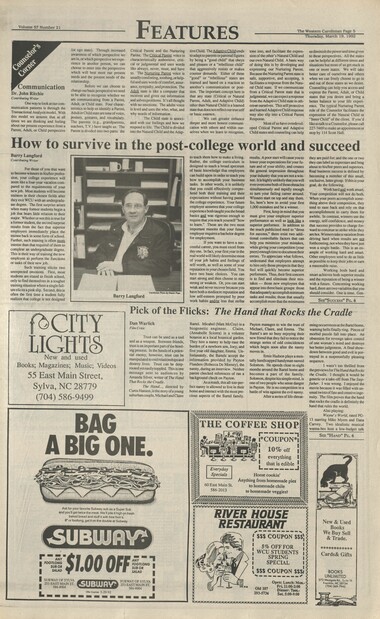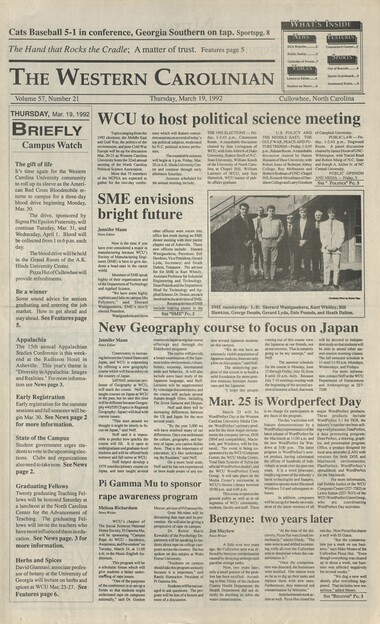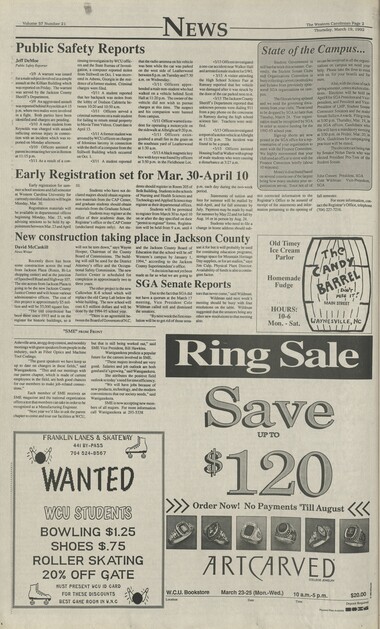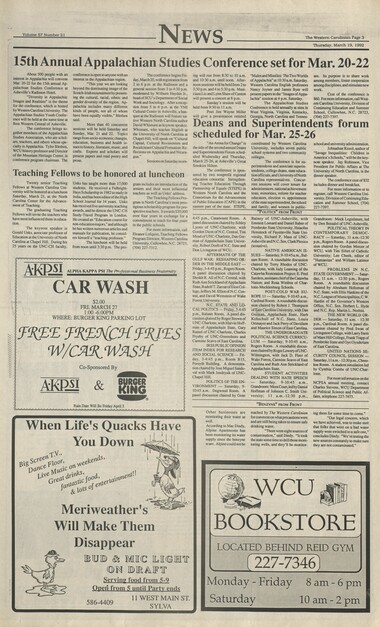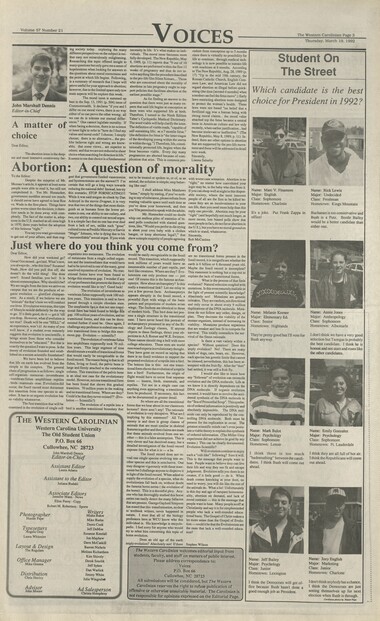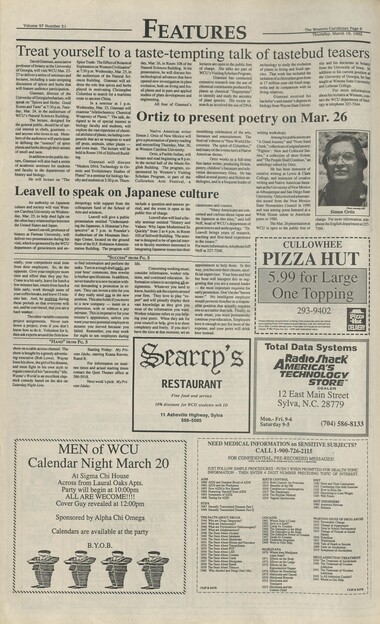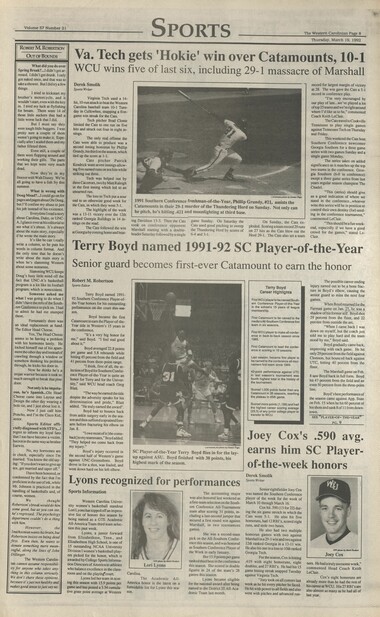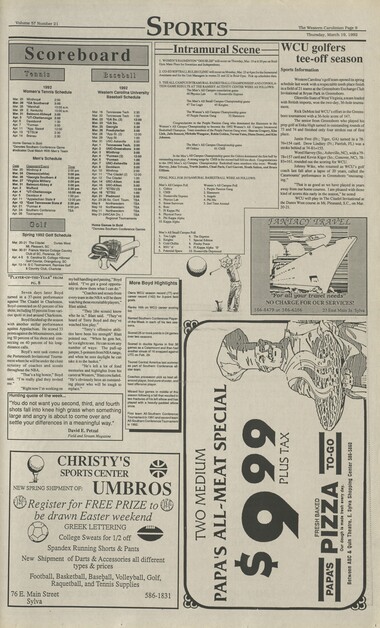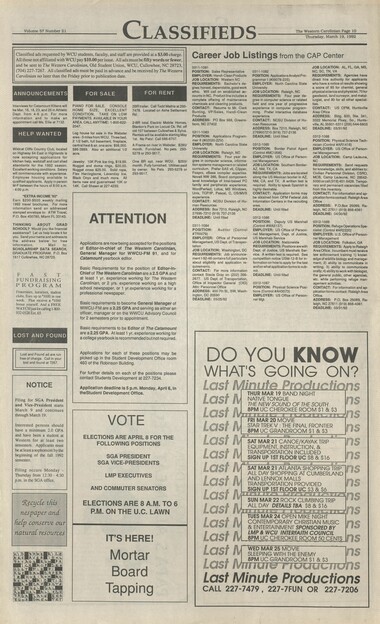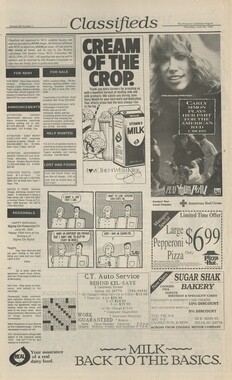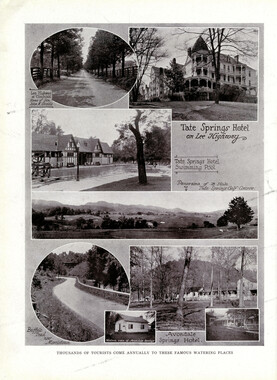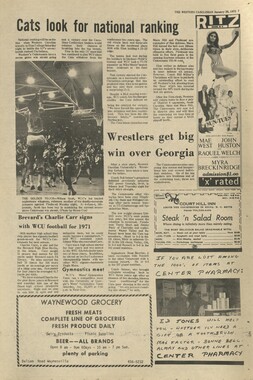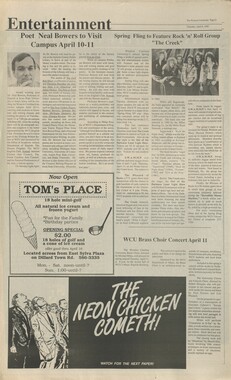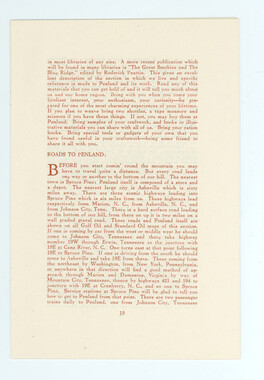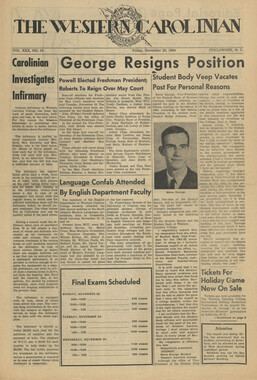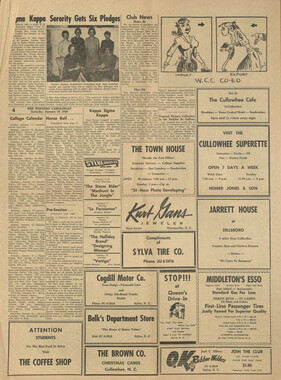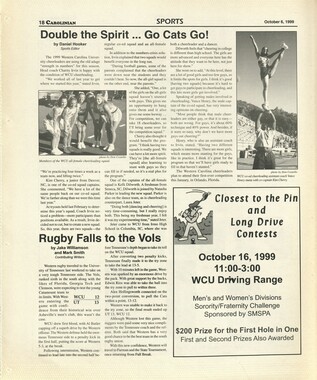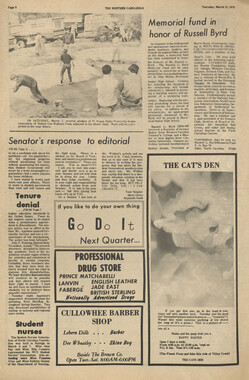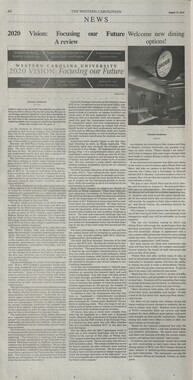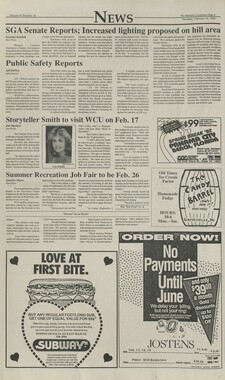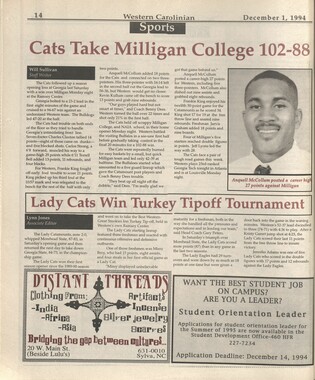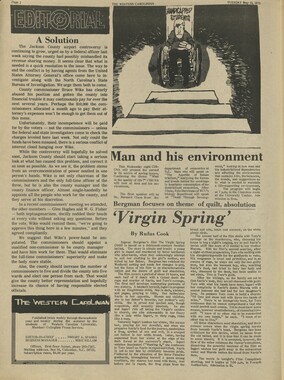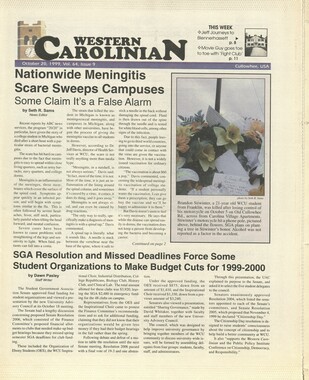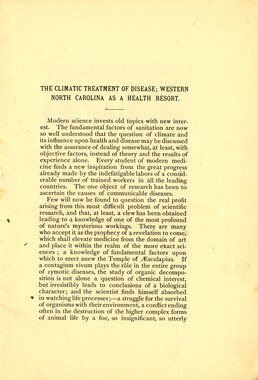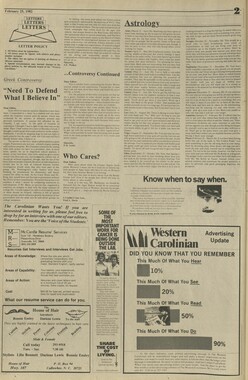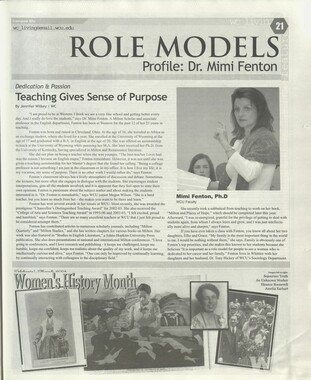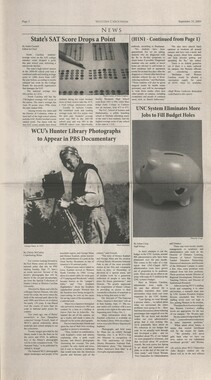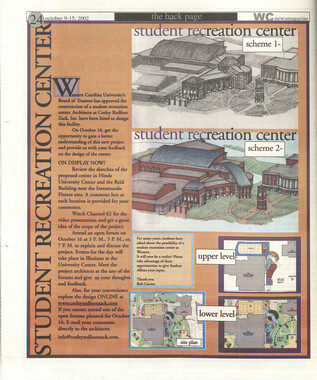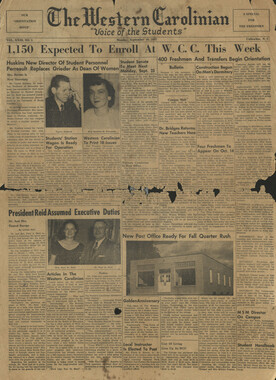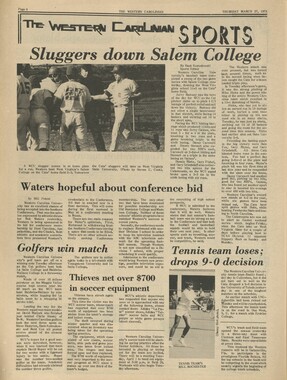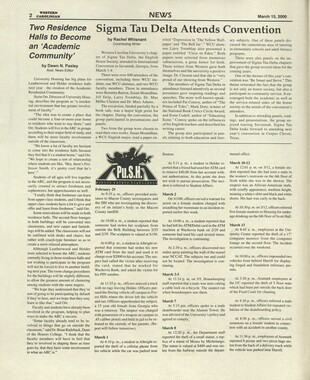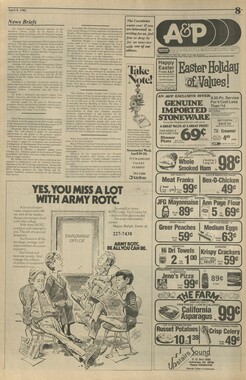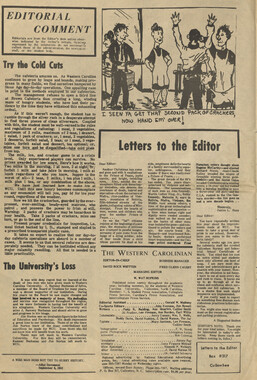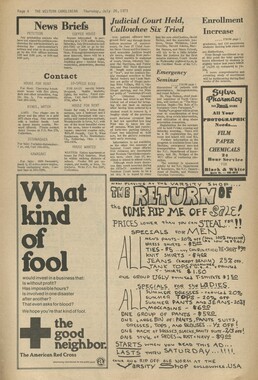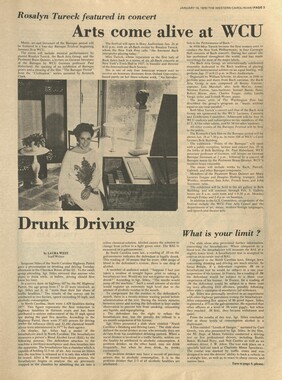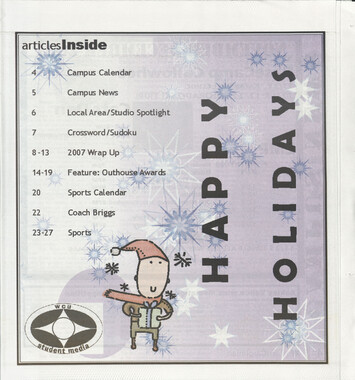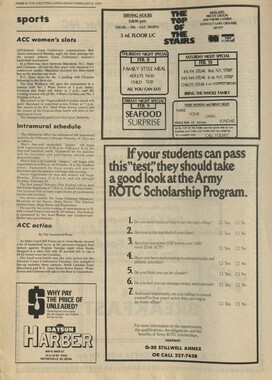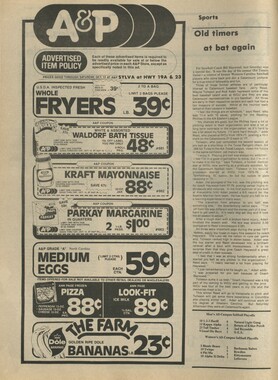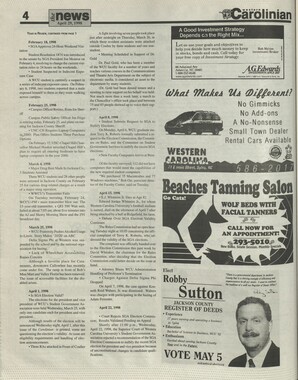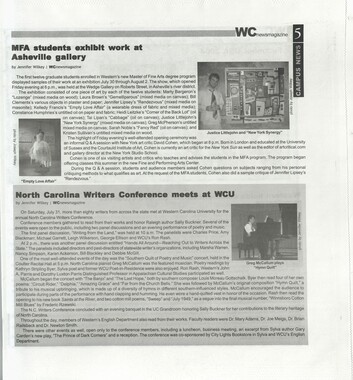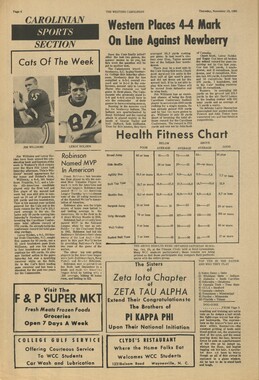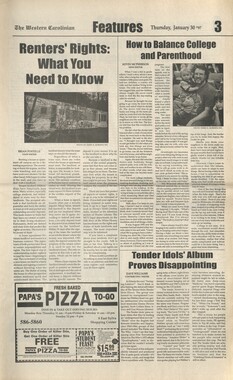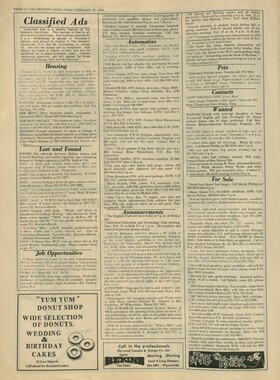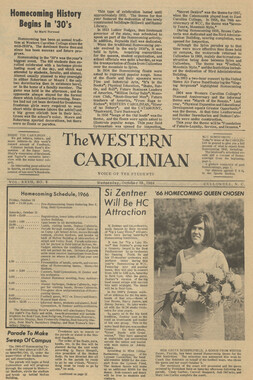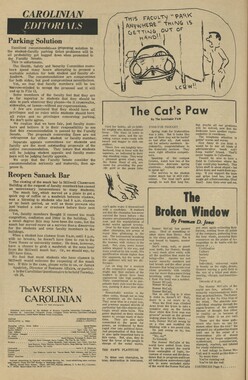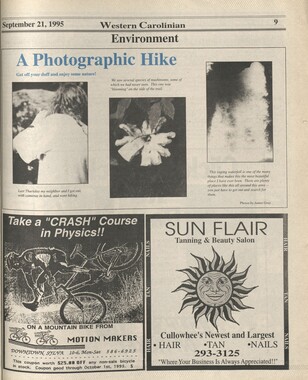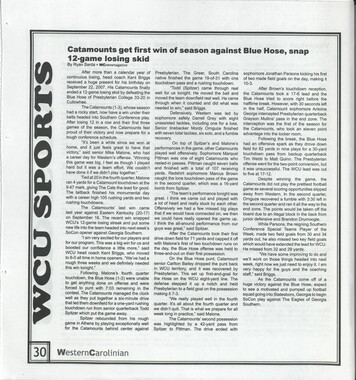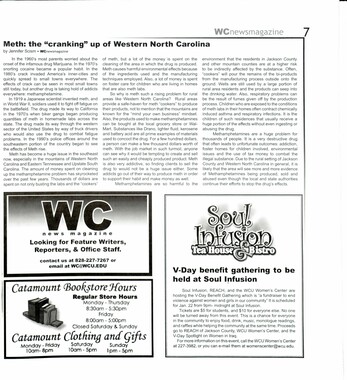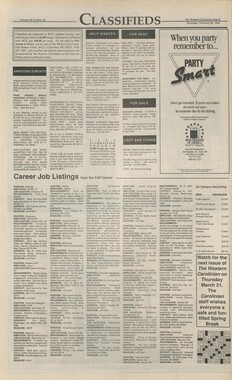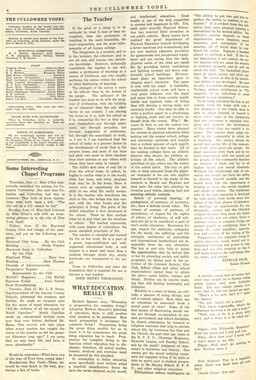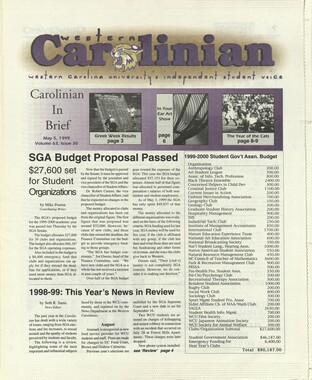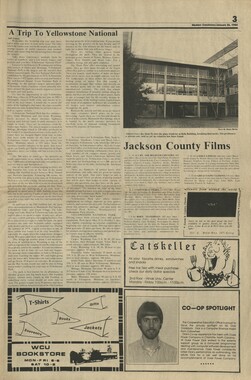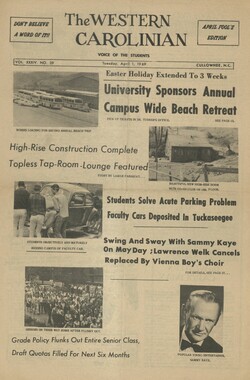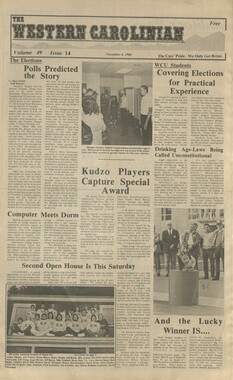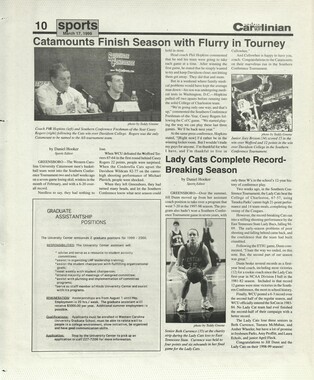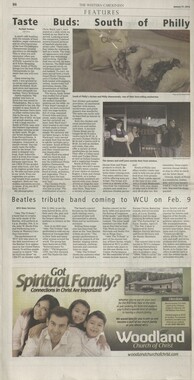Western Carolina University (21)
View all
- Canton Champion Fibre Company (2308)
- Cherokee Traditions (291)
- Civil War in Southern Appalachia (165)
- Craft Revival (1942)
- George Masa Collection (137)
- Great Smoky Mountains - A Park for America (2900)
- Highlights from Western Carolina University (422)
- Horace Kephart (941)
- Journeys Through Jackson (159)
- LGBTQIA+ Archive of Jackson County (85)
- Oral Histories of Western North Carolina (314)
- Picturing Appalachia (6797)
- Stories of Mountain Folk (413)
- Travel Western North Carolina (153)
- Western Carolina University Fine Art Museum Vitreograph Collection (129)
- Western Carolina University Herbarium (92)
- Western Carolina University: Making Memories (738)
- Western Carolina University Publications (2491)
- Western Carolina University Restricted Electronic Theses and Dissertations (146)
- Western North Carolina Regional Maps (71)
- World War II in Southern Appalachia (131)
University of North Carolina Asheville (6)
View all
- Allanstand Cottage Industries (62)
- Appalachian National Park Association (53)
- Bennett, Kelly, 1890-1974 (1463)
- Berry, Walter (76)
- Brasstown Carvers (40)
- Carver, George Washington, 1864?-1943 (26)
- Cathey, Joseph, 1803-1874 (1)
- Champion Fibre Company (233)
- Champion Paper and Fibre Company (297)
- Cherokee Indian Fair Association (16)
- Cherokee Language Program (22)
- Crowe, Amanda (40)
- Edmonston, Thomas Benton, 1842-1907 (7)
- Ensley, A. L. (Abraham Lincoln), 1865-1948 (275)
- Fromer, Irving Rhodes, 1913-1994 (70)
- George Butz (BFS 1907) (46)
- Goodrich, Frances Louisa (120)
- Grant, George Alexander, 1891-1964 (96)
- Heard, Marian Gladys (60)
- Kephart, Calvin, 1883-1969 (15)
- Kephart, Horace, 1862-1931 (313)
- Kephart, Laura, 1862-1954 (39)
- Laney, Gideon Thomas, 1889-1976 (439)
- Masa, George, 1881-1933 (61)
- McElhinney, William Julian, 1896-1953 (44)
- Niggli, Josephina, 1910-1983 (10)
- North Carolina Park Commission (105)
- Osborne, Kezia Stradley (9)
- Owens, Samuel Robert, 1918-1995 (11)
- Penland Weavers and Potters (36)
- Roberts, Vivienne (15)
- Roth, Albert, 1890-1974 (142)
- Schenck, Carl Alwin, 1868-1955 (1)
- Sherrill's Photography Studio (2565)
- Southern Highland Handicraft Guild (127)
- Southern Highlanders, Inc. (71)
- Stalcup, Jesse Bryson (46)
- Stearns, I. K. (213)
- Thompson, James Edward, 1880-1976 (226)
- United States. Indian Arts and Crafts Board (130)
- USFS (683)
- Vance, Zebulon Baird, 1830-1894 (1)
- Weaver, Zebulon, 1872-1948 (58)
- Western Carolina College (230)
- Western Carolina Teachers College (282)
- Western Carolina University (2008)
- Western Carolina University. Mountain Heritage Center (18)
- Whitman, Walt, 1819-1892 (10)
- Wilburn, Hiram Coleman, 1880-1967 (73)
- Williams, Isadora (3)
- Cain, Doreyl Ammons (0)
- Crittenden, Lorraine (0)
- Rhodes, Judy (0)
- Smith, Edward Clark (0)
- Appalachian Region, Southern (2929)
- Asheville (N.C.) (1944)
- Avery County (N.C.) (26)
- Blount County (Tenn.) (195)
- Buncombe County (N.C.) (1680)
- Cherokee County (N.C.) (283)
- Clay County (N.C.) (556)
- Graham County (N.C.) (238)
- Great Smoky Mountains National Park (N.C. and Tenn.) (525)
- Haywood County (N.C.) (3571)
- Henderson County (N.C.) (70)
- Jackson County (N.C.) (4917)
- Knox County (Tenn.) (35)
- Knoxville (Tenn.) (13)
- Lake Santeetlah (N.C.) (10)
- Macon County (N.C.) (420)
- Madison County (N.C.) (216)
- McDowell County (N.C.) (39)
- Mitchell County (N.C.) (135)
- Polk County (N.C.) (35)
- Qualla Boundary (982)
- Rutherford County (N.C.) (78)
- Swain County (N.C.) (2185)
- Transylvania County (N.C.) (270)
- Watauga County (N.C.) (12)
- Waynesville (N.C.) (86)
- Yancey County (N.C.) (72)
- Aerial Photographs (3)
- Aerial Views (60)
- Albums (books) (4)
- Articles (1)
- Artifacts (object Genre) (228)
- Bibliographies (1)
- Biography (general Genre) (2)
- Cards (information Artifacts) (38)
- Clippings (information Artifacts) (191)
- Copybooks (instructional Materials) (3)
- Crafts (art Genres) (622)
- Depictions (visual Works) (21)
- Design Drawings (1)
- Drawings (visual Works) (185)
- Envelopes (73)
- Exhibitions (events) (1)
- Facsimiles (reproductions) (1)
- Fiction (general Genre) (4)
- Financial Records (12)
- Fliers (printed Matter) (67)
- Glass Plate Negatives (381)
- Guidebooks (2)
- Internegatives (10)
- Interviews (815)
- Land Surveys (102)
- Letters (correspondence) (1013)
- Manuscripts (documents) (618)
- Maps (documents) (177)
- Memorandums (25)
- Minutes (administrative Records) (59)
- Negatives (photographs) (6090)
- Newsletters (1290)
- Newspapers (2)
- Notebooks (8)
- Occupation Currency (1)
- Paintings (visual Works) (1)
- Pen And Ink Drawings (1)
- Periodicals (193)
- Personal Narratives (10)
- Photographs (12976)
- Plans (maps) (1)
- Poetry (5)
- Portraits (4568)
- Postcards (329)
- Programs (documents) (181)
- Publications (documents) (2443)
- Questionnaires (65)
- Relief Prints (26)
- Sayings (literary Genre) (1)
- Scrapbooks (282)
- Sheet Music (2)
- Slides (photographs) (402)
- Songs (musical Compositions) (2)
- Sound Recordings (796)
- Specimens (92)
- Speeches (documents) (18)
- Tintypes (photographs) (8)
- Transcripts (322)
- Video Recordings (physical Artifacts) (23)
- Text Messages (0)
- A.L. Ensley Collection (275)
- Appalachian Industrial School Records (7)
- Appalachian National Park Association Records (336)
- Axley-Meroney Collection (2)
- Bayard Wootten Photograph Collection (20)
- Bethel Rural Community Organization Collection (7)
- Blumer Collection (5)
- C.W. Slagle Collection (20)
- Canton Area Historical Museum (2110)
- Carlos C. Campbell Collection (462)
- Cataloochee History Project (64)
- Cherokee Studies Collection (4)
- Daisy Dame Photograph Album (5)
- Daniel Boone VI Collection (1)
- Doris Ulmann Photograph Collection (112)
- Elizabeth H. Lasley Collection (1)
- Elizabeth Woolworth Szold Fleharty Collection (4)
- Frank Fry Collection (95)
- George Masa Collection (173)
- Gideon Laney Collection (452)
- Hazel Scarborough Collection (2)
- Hiram C. Wilburn Papers (28)
- Historic Photographs Collection (236)
- Horace Kephart Collection (861)
- Humbard Collection (33)
- Hunter and Weaver Families Collection (1)
- I. D. Blumenthal Collection (4)
- Isadora Williams Collection (4)
- Jesse Bryson Stalcup Collection (47)
- Jim Thompson Collection (224)
- John B. Battle Collection (7)
- John C. Campbell Folk School Records (80)
- John Parris Collection (6)
- Judaculla Rock project (2)
- Kelly Bennett Collection (1482)
- Love Family Papers (11)
- Major Wiley Parris Civil War Letters (3)
- Map Collection (12)
- McFee-Misemer Civil War Letters (34)
- Mountain Heritage Center Collection (4)
- Norburn - Robertson - Thomson Families Collection (44)
- Pauline Hood Collection (7)
- Pre-Guild Collection (2)
- Qualla Arts and Crafts Mutual Collection (12)
- R.A. Romanes Collection (681)
- Rosser H. Taylor Collection (1)
- Samuel Robert Owens Collection (94)
- Sara Madison Collection (144)
- Sherrill Studio Photo Collection (2558)
- Smoky Mountains Hiking Club Collection (616)
- Stories of Mountain Folk - Radio Programs (374)
- The Reporter, Western Carolina University (510)
- Venoy and Elizabeth Reed Collection (16)
- WCU Gender and Sexuality Oral History Project (32)
- WCU Mountain Heritage Center Oral Histories (25)
- WCU Oral History Collection - Mountain People, Mountain Lives (71)
- WCU Students Newspapers Collection (1923)
- Western North Carolina Tomorrow Black Oral History Project (69)
- William Williams Stringfield Collection (2)
- Zebulon Weaver Collection (109)
- African Americans (390)
- Appalachian Trail (35)
- Artisans (521)
- Cherokee art (84)
- Cherokee artists -- North Carolina (10)
- Cherokee language (21)
- Cherokee pottery (101)
- Cherokee women (208)
- Church buildings (190)
- Civilian Conservation Corps (U.S.) (111)
- College student newspapers and periodicals (2012)
- Dams (108)
- Dance (1023)
- Education (222)
- Floods (61)
- Folk music (1015)
- Forced removal, 1813-1903 (2)
- Forest conservation (220)
- Forests and forestry (1196)
- Gender nonconformity (4)
- Great Smoky Mountains National Park (N.C. and Tenn.) (181)
- Hunting (46)
- Landscape photography (25)
- Logging (119)
- Maps (83)
- Mines and mineral resources (9)
- North Carolina -- Maps (18)
- Paper industry (38)
- Postcards (255)
- Pottery (135)
- Railroad trains (72)
- Rural electrification -- North Carolina, Western (3)
- School integration -- Southern States (2)
- Segregation -- North Carolina, Western (5)
- Slavery (5)
- Sports (452)
- Storytelling (243)
- Waterfalls -- Great Smoky Mountains (N.C. and Tenn.) (66)
- Weaving -- Appalachian Region, Southern (280)
- Wood-carving -- Appalachian Region, Southern (328)
- World War, 1939-1945 (173)
Western Carolinian Volume 57 Number 21
Item
Item’s are ‘child’ level descriptions to ‘parent’ objects, (e.g. one page of a whole book).
-
-
Volume 57 Number 21 Features The Western Carolinian Page 5 Thursday, March 19. 1992 Communication Dr. John Ritchie Contributing Writer One way to look at our communication patterns is through the Transactional Analysis model. With this model we assume that at all times we are thinking and feeling about our present experience from a Parent, Adult, or Child perspective (or ego state). Through increased awareness of which perspective we are in, or which perspective we experience in another person, we can choose to enter into the perspective which will best meet our present needs and the present needs of the relationship. Before we can choose to change our basic perspective we need to be able to recognize whether we are communicating from a Parent, Adult, or Child state. Four characteristics to help us identify a Parent, Adult or Child state are tone of voice, posture, gestures, and vocabulary. The parents (e.g., grandparents, teachers, T.V.) have taught us. The Parent is divided into two parts: the Critical Parent and the Nurturing Parent The Critical Parent voice is characteristically authoritive, critical or judgmental and uses words like always, never, must, and have to. The Nurturing Parent voice is usually comforting, soothing, or helpful and uses words of comfort, assurance, sympathy, and protection. The Adult state is like a computer that receives and gives out information and solves problems. It's all thought ' with no emotions. The adults voice is level and uses the who, what, and why words of information. The Child state is associated with our feelings and how we respond to life. The Child is divided into the Natural Child and the Adap tive Child. The Adaptive Child tends to adapt to parents or parental figures by being a "good child" that obeys and pleases or a "rebellious child" that aggressively resists or makes counter demands. Either of these "good" or "rebellious" states are learned and based on a reaction to another's communication or position. The important concept here is that any state (Critical or Natural Parent, Adult, and Adaptive Child) other than Natural Child is a learned state that does not reflect our true self or basic essence. We can greater enhance deeper and more honest communication with others and within ourselves when we learn to recognize, tone into, and facilitate the expression of the other's Natural Child and our own Natural Child. A basic way of doing this is by developing and expressing our Nurturing Parent. Because the Nurturing Parent state is safe, supportive, and accepting, it facilitates a response from the Natural Child state. If we communicate from a Critical Parent state that is judgmental, we can expect a response from the Adaptive Child state in oth- ersor ourselves. This self protective and learned Adaptive Child response may also slip into a Critical Parent Response. Most of us have overdeveloped Critical Parent and Adaptive Child states and counseling can help us diminish the power and time given to these perspectives. All the states can be helpful at different times and situations but most of us get stuck in one or more states. We will take better care of ourselves and others when we can freely choose to go in and out of these states as we desire. Counseling can help you access and express the Parent, Adult, or Child states that you desire and bring a better balance to your life experience. The typical Nurturing Parent role of the Counselor facilitates the expression of the Natural Child or "Inner Child" of the client. If you'd like to talk to a Counselor, please call 227-7469 to make an appointment or stop by 114 Scott Hall. How to survive in the post-college world and succeed Barry Langford Contributing Writer For those of you that want to become winners in his/her profession, your college experience will seem like a four-year vacation compared to the requirements of your new job. Most students will become trainees in their chosen fields after they exit WCU with an undergraduate degree. The first surprise arises when many former students begin a job that bears little relation to their major. Whether or not this is true for a former student, the second surprise results from the fact that superior employers immediately place the trainee back in some form of school. Further, such training is often more intense than that required of them to complete an undergraduate degree. This is their way of training the new employee to perform the functions or tasks of their new job. Such training elicits two unexpected emotions. First, most students are elated to finish school, only to find themselves in a tougher training situation where a single failure elicits a pink slip. Second, this is often the first time a student fully realizes that college is not designed to teach them how to make a living. Rather, the college curriculum is designed to teach a broad spectrum of basic knowledge that employers can build upon in order to teach you how to accomplish your business tasks. In other words, it is unlikely that you could effectively comprehend both their training and their expectations without having passed the college experience. Your future employer assumes that your college experience both taught you the broad basics and was rigorous enough to require that you teach yourself "how to learn." These are the two most important reasons that your future employer requires a bachelor degree for employment If you want to have a successful career, you must excel from day one. In fact, your first year in the real world will likely determine most of your job habits and feelings of self-worth, as well as some of your reputation in your chosen field. You have two basic choices. You can start strong and then choose to stay strong or weaken. Or, you can start weak and never recover because you have both a mediocre reputation and low self-esteem prompted by poor work habits and/or less that stellar results. A poor start will cause you to lower your expectations for your future and of your ability, and creates the general impression throughout your industry that you are not a winner. It is highly unlikely that you will ever overcome both of theseobstacles simultaneously and rapidly enough to turn your failing career around. Winners start on top and stay there. So, here's how to avoid your first 1,000 mistakes and be a winner. First, keep in mind that you must give your employer superior performance as well as look like a superior performer. In addition to the much publicized need to "dress for success," there exist two additional controllable factors that can help you minimize your mistakes, while giving your competition (your peers) enough time to document their errors. To appreciate what follows, understand that employers attempt to hire only those prospects that they feel will quickly become superior performers. Thus, their first concern is to find and eliminate their mistakes — those new employees that appear into three basic groups: those that adequately accomplish minimum tasks and results; those that usually accomplish more that the minimums they are paid for; and the one or two they can label as superstars and brag about to his/her peers and superiors. Real business success is defined by becoming a member of this small, exclusive, latter group. Ifthisisyour goal, do the following. Work hard and. work smart. Your competition will not do both. When your peers accomplish something above their competition, they tend to ease back and rely on that accomplishment to carry them for awhile. In contrast, winners use the energy, self-confidence, and money that success provides to charge forward to continue to strike while they are hot. Winners take a vacation from driving hard when results are not forthcoming, not when they have just won a single battle. This is an example of working hard and smart. Other employees tend to do as little as possible to keep their jobs or earn a reasonable raise. Working both hard and smart achieves both superior results and the reputation of being a winner with a future. Concerning working hard, there are two variables that you should consider. One is time. Gen- See"Success" Pg. 6 f^CITY LiGim New and used Books; Magazines; Music; Videos 55 East Main Street, Iva, NC 28779 586-9499 Syl (704) Pick of the Flicks: The Hand that Rocks the Cradle Dan Warlick Film Critic Trust can be used as a tool and as a weapon. Between friends, trust is an important part of the bonding process. In the hands of a potential enemy, however, trust can be manipulated to end relationships and destroy lives. Trust can be deep- rooted yet easily toppled. This is one message sent to audiences by Amanda Silver, writer of The Hand That Rocks the Cradle. The Hand..., directed by Curtis Hanson, is the story of a young suburban couple, Michael and Claire Bartel. Micahel (Matt McCoy) is a biogenetic engineer. Claire, (Annabelle Sciorra) is a voluteer botanist at a local botanical garden. They hire a nanny to help ease the burden of a newborn son, Joey, and five year old daughter, Emma. Unfortunately, the Battels accept the information provided by Payton Flanders (Rebecca De Morney), the nanny, during an interview. Neither parent checked references of ran a background check on Payton. As a result, this all-too-perfect nanny is allowed to live in their home and interact with the most precious aspects of the Bartel family. Payton manages to win the trust of Michael, Claire, and Emma. The Bartel's are so busy enjoying their new friend that they fail to notice the strange series of odd coincidences which begin soon after the nanny moves in. Ernie Hudson plays a mentally handicapped handyman named Solomon. He spends close to eight months around the Bartel home and becomes a part of the family. Solomon, despite his simple mind, is one of two people who sense danger in Payton. He is no competition in a battle of wits against the evil nanny. After a series of life-threat- BAG A BIG ONE. fTHE COFFEE SHOE! Ask lor your favorite Subway sub as a Super Sub and you'll get twice the meat. We'll pile it high on fresh baked bread and stuff it with free fixin's* 6" or foollong, get it on the double at Subway. 10% Off everything that is edible lp !I i 60 East Main St. 586-2013 ening occurrences at the Bartel home, warning bells finally ring. Pieces of morbid puzzle fall into place. An obsession for revenge takes control of one woman's mind and destroys her better judgement. A final showdown between good and evil is portrayed in a suspensefully pleasing sequence. I wasn't too thrilled from the previews for The Hand that Rocks the Cradle. I thought it would be generic or a take-off from The Stepfather. I was wrong. I enjoyed the movie because it was filled with unusual twistsof fate and creative ingenuity. The film proves that the hand that rocks the cradle is definitely the hand that rules the world. Also playing: Wayne's World, rated PG- 13 starring Mike Myers and Dana Carvey. Two idealistic musical wanna-bes host a low-budget talk r i i i i L ANY FOOTLONG SUB OK SALAD $100 OFF ANY FOOTLONG SUB OR SALAD SUBWAY OF SYLVA 253 EAST MAIN ST. 586-4004 Offer Expire*: 3-29-92 SUBWAY OF SYLVA 253 EAST MAIN ST. 586-4004 n i i i i j ,—. n., l*COUPON*|||f I I that is edible 'it Home cookin' Anything from homemade pies to homemade chile to homemade veggiesr i See "Hand" Pg. 6 MVER HOUSE RESTAURANT ['$$$ COUPON $$$* r^r 5% OFF FOR WCU STUDENTS SPRING SPECIAL $$$ COUPON $$$i Old 107 293-5736 Open: Lunch: Mon. Fri, 11:00-2:00 Dinner: Tues.- Sat 5:00-9:00 New & Used Books We Buy Sell & Trade. ************ Cards& Gifts BOOKS UNLIMITED 372 Westgate Rd, Suite 16 Franklin, NC 28734 (704) 369-7942
Object
Object’s are ‘parent’ level descriptions to ‘children’ items, (e.g. a book with pages).
-
The Western Carolinian is Western Carolina University's student-run newspaper. The paper was published as the Cullowhee Yodel from 1924 to 1931 before changing its name to The Western Carolinian in 1933.
-
